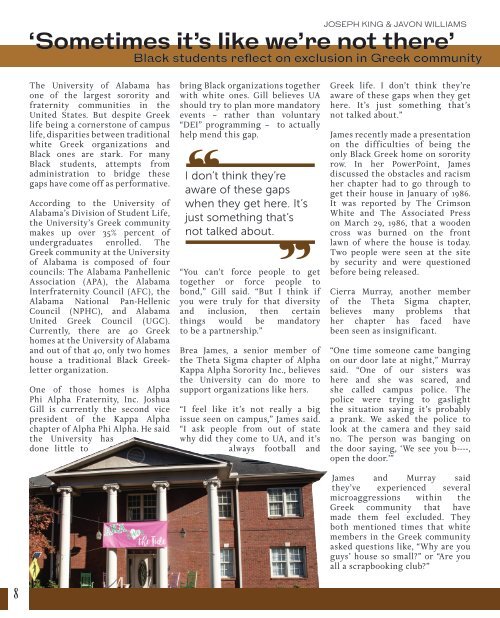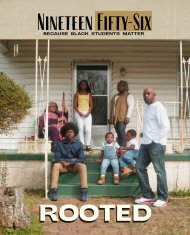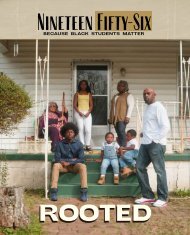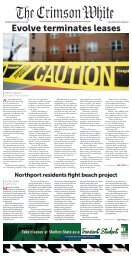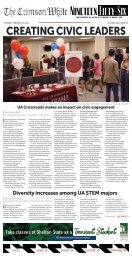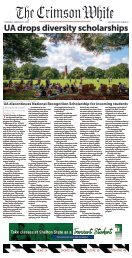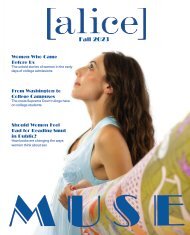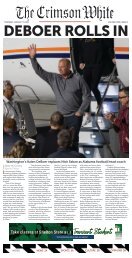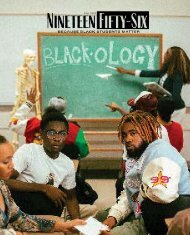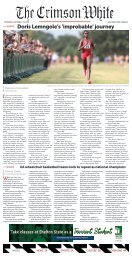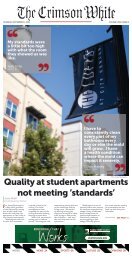CW + 1956 Collab Edition
In this first-ever collaborative issue between Nineteen-Fifty-Six and The Crimson White, we bring you stories of frustration and hope, change and stagnation, raging against the machine and working to change it from within. We hope you enjoy reading it as much as we enjoyed making it for you.
In this first-ever collaborative issue between Nineteen-Fifty-Six and The Crimson White, we bring you stories of frustration and hope, change and stagnation, raging against the machine and working to change it from within. We hope you enjoy reading it as much as we enjoyed making it for you.
You also want an ePaper? Increase the reach of your titles
YUMPU automatically turns print PDFs into web optimized ePapers that Google loves.
JOSEPH KING & JAVON WILLIAMS<br />
‘Sometimes it’s like we’re not there’<br />
Black students reflect on exclusion in Greek community<br />
The University of Alabama has<br />
one of the largest sorority and<br />
fraternity communities in the<br />
United States. But despite Greek<br />
life being a cornerstone of campus<br />
life, disparities between traditional<br />
white Greek organizations and<br />
Black ones are stark. For many<br />
Black students, attempts from<br />
administration to bridge these<br />
gaps have come off as performative.<br />
According to the University of<br />
Alabama’s Division of Student Life,<br />
the University’s Greek community<br />
makes up over 35% percent of<br />
undergraduates enrolled. The<br />
Greek community at the University<br />
of Alabama is composed of four<br />
councils: The Alabama Panhellenic<br />
Association (APA), the Alabama<br />
Interfraternity Council (AFC), the<br />
Alabama National Pan-Hellenic<br />
Council (NPHC), and Alabama<br />
United Greek Council (UGC).<br />
Currently, there are 40 Greek<br />
homes at the University of Alabama<br />
and out of that 40, only two homes<br />
house a traditional Black Greekletter<br />
organization.<br />
One of those homes is Alpha<br />
Phi Alpha Fraternity, Inc. Joshua<br />
Gill is currently the second vice<br />
president of the Kappa Alpha<br />
chapter of Alpha Phi Alpha. He said<br />
the University has<br />
done little to<br />
bring Black organizations together<br />
with white ones. Gill believes UA<br />
should try to plan more mandatory<br />
events – rather than voluntary<br />
“DEI” programming – to actually<br />
help mend this gap.<br />
I don’t think they’re<br />
aware of these gaps<br />
when they get here. It’s<br />
just something that’s<br />
not talked about.<br />
“You can’t force people to get<br />
together or force people to<br />
bond,” Gill said. “But I think if<br />
you were truly for that diversity<br />
and inclusion, then certain<br />
things would be mandatory<br />
to be a partnership.”<br />
Brea James, a senior member of<br />
the Theta Sigma chapter of Alpha<br />
Kappa Alpha Sorority Inc., believes<br />
the University can do more to<br />
support organizations like hers.<br />
“I feel like it’s not really a big<br />
issue seen on campus,” James said.<br />
“I ask people from out of state<br />
why did they come to UA, and it’s<br />
always football and<br />
Greek life. I don’t think they’re<br />
aware of these gaps when they get<br />
here. It’s just something that’s<br />
not talked about.”<br />
James recently made a presentation<br />
on the difficulties of being the<br />
only Black Greek home on sorority<br />
row. In her PowerPoint, James<br />
discussed the obstacles and racism<br />
her chapter had to go through to<br />
get their house in January of 1986.<br />
It was reported by The Crimson<br />
White and The Associated Press<br />
on March 29, 1986, that a wooden<br />
cross was burned on the front<br />
lawn of where the house is today.<br />
Two people were seen at the site<br />
by security and were questioned<br />
before being released.<br />
Cierra Murray, another member<br />
of the Theta Sigma chapter,<br />
believes many problems that<br />
her chapter has faced have<br />
been seen as insignificant.<br />
“One time someone came banging<br />
on our door late at night,” Murray<br />
said. “One of our sisters was<br />
here and she was scared, and<br />
she called campus police. The<br />
police were trying to gaslight<br />
the situation saying it’s probably<br />
a prank. We asked the police to<br />
look at the camera and they said<br />
no. The person was banging on<br />
the door saying, ‘We see you b----,<br />
open the door.’”<br />
James and Murray said<br />
they’ve experienced several<br />
microaggressions within the<br />
Greek community that have<br />
made them feel excluded. They<br />
both mentioned times that white<br />
members in the Greek community<br />
asked questions like, “Why are you<br />
guys’ house so small?” or “Are you<br />
all a scrapbooking club?”<br />
8


